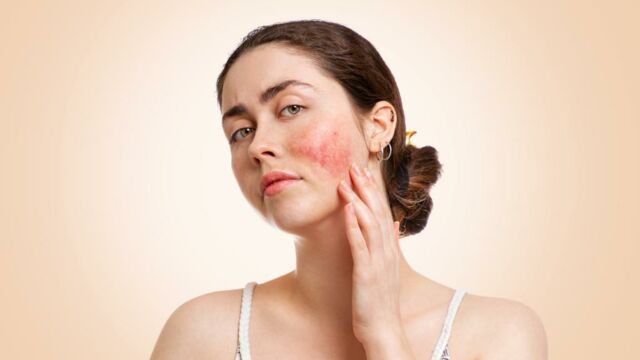If you suffer from rosacea your skin might be patchy, red, inflamed or dry, and acne-like bumps might appear, especially across the cheeks. Triggers of rosacea are varied and can come from your diet (spicy food and alcohol) or, like acne, from hormonal fluctuations (hello stress!). However, many topical skincare products are able to offer relief from the symptoms of rosacea.
Discover our latest podcast
Moreover, building a skincare regime that doesn't trigger your rosacea is just as important to keep those flare-ups at bay. So if you're questioning where to start, follow our step-by-step guide below:
Gently cleanse
Since rosacea-prone skin tends to be slightly dry and sensitive, a gentle cleanser is a must-have. Avoid scrubs, or cleansers containing stripping ingredients such as sodium lauryl sulfate (SLS) or alcohol, which will aggravate your skin further. Instead opt for non-foaming cleansers, such as cleansing milks, oils and balms, which will help your skin maintain a good level of moisture.
Treat with serums
There are a few skincare ingredients that can help reduce the appearance of rosacea and calm your skin. For example, niacinamide, made from vitamin B3, is anti-inflammatory and can help to minimise redness, as well as fight acne, and fade discolouration. Similarly, vitamin c can be a great option to reduce inflammation and promote healing.

Maximise moisture
Maintaining a healthy and strong skin barrier is vital for rosacea sufferers as this acts to shield your skin from irritants. Applying moisturiser twice a day is therefore a must. Look out for calming and skin barrier-supporting ingredients like oat, rice, ceramides, and glycerin.
SPF it up
Sun exposure can often worsen the symptoms of rosacea, so be sure to wear an SPF every single day. Try to avoid suncreams containing alcohol, or if your skin is very sensitive, opt for a mineral/physical suncream containing zinc oxide which has the added benefit for rosacea-prone skin of being anti-inflammatory.
Track your triggers
At the end of the day, building a skin care regime for rosacea-prone skin is highly personal and may take some trial and error. If you have an adverse reaction to a product, make a note of its ingredients to figure out if any of them specifically trigger a reaction from your skin!
Sources used:
The Skin Spot: How to find the best skincare for rosacea'
My Face Dr: 'Top 5 skincare ingredients to treat rosacea'
Read more:
⋙ Prevent hair loss with this beauty trend















